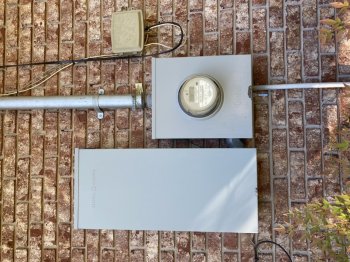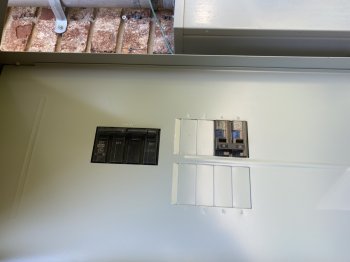You are using an out of date browser. It may not display this or other websites correctly.
You should upgrade or use an alternative browser.
You should upgrade or use an alternative browser.
My HT oven makes my lights flicker?
- Thread starter Chris Railey
- Start date
Chris Railey
Well-Known Member
The service for the house goes to a fuse box inside the house. I was wanting to put a breaker box in my shop and just run three dedicated outlets for my big tools which are all on the same wall.Is the breaker panel attached/under the meter base? Or does the service entrance cable go from the meter base to the fused panel located somewhere else in the house
opaul
KNIFE MAKER
Got it. I’m not an electrician but have worked in the distribution power industry.The service for the house goes to a fuse box inside the house. I was wanting to put a breaker box in my shop and just run three dedicated outlets for my big tools which are all on the same wall.
Theses are the senarios I see
1. Most likely the fuse box is at capacity now and that would limit the ability to pull a dedicated circuit to your shop with the proper circuit protection. I’m thinking it’s probably a 100 amp base (hopefully not 60 amp).
2. The incoming wire from the power company, either underground or overhead may need to be upgraded.
3. The electrician will most likely recommend changing out the existing meter base and install a 200 amp meter base/breaker box at the existing meter base location. He could then install a 100amp breaker to maintain/sub feed your existing panel. He could then install dedicated runs with breaker protection to your kiln and other outlets you might need.
EdCaffreyMS
"The Montana Bladesmith"
This is actually a good discussion. Something that many folks don't consider is having the power required to run the various machines in their shop(s). Often times I see individuals trying to run an entire "knife shop" in a garage, that has one 20 amp circuit, and they can't figure out why that breaker keeps tripping.
I've also seen instances where individuals have lost their entire shop and house because of overloading. Yes, it might cost some $$$ to get the proper upgrades for powering your shop, but it sure beats hearing the insurance company refusing to pay up when they investigate the fire in which you lost everything, and find that a circuit was overloaded and caused the fire. I can see folks rolling their eyes right now..... but it happens far more often then you'd think.
I myself had to curtail the equipment in my shops when I built my new Hot Shop a while back..... because I'd have to run a brand new service to that building..... and it just wasn't in the budget. I wanted to buy a 250lb power hammer I'd been eyeing for some time, but had to settle for the 110lb Say-Mak because of power requirements. (I know...you're saying "poor Ed") Later on, when I purchased Orange Crush (my 80 tone press), from a close friend in Canada, the only reason I could, was because it runs off a 4 cyl kabota diesel setup to run the hydraulics. I didn't have enough electric power in my entire Hot Shop to run the electric motor necessary to run it.
Later on, when I purchased Orange Crush (my 80 tone press), from a close friend in Canada, the only reason I could, was because it runs off a 4 cyl kabota diesel setup to run the hydraulics. I didn't have enough electric power in my entire Hot Shop to run the electric motor necessary to run it.
So no matter what level you're at in Bladesmithing/Knifemaking, it's always in your best interests to examine how much power your shop/machines pull, and ensure that you service can/does handle it PROPERLY.
I've also seen instances where individuals have lost their entire shop and house because of overloading. Yes, it might cost some $$$ to get the proper upgrades for powering your shop, but it sure beats hearing the insurance company refusing to pay up when they investigate the fire in which you lost everything, and find that a circuit was overloaded and caused the fire. I can see folks rolling their eyes right now..... but it happens far more often then you'd think.
I myself had to curtail the equipment in my shops when I built my new Hot Shop a while back..... because I'd have to run a brand new service to that building..... and it just wasn't in the budget. I wanted to buy a 250lb power hammer I'd been eyeing for some time, but had to settle for the 110lb Say-Mak because of power requirements. (I know...you're saying "poor Ed")
So no matter what level you're at in Bladesmithing/Knifemaking, it's always in your best interests to examine how much power your shop/machines pull, and ensure that you service can/does handle it PROPERLY.
Chris Railey
Well-Known Member
I hope to get an answer (estimate) today. My electrician friend said he could check it out this afternoon. I will let you guys know. The ice storm we had a few years ago actually tore the mast off of my house so everything up there is new and inspected. I am guessing houses built in 60's just were not wired for a garage shop. Hopefully we can do what I am thinking. I have never blown a fuse in house since i have owned it for nearly 20 years. Prayerfully it is a simple fix.
Chris Railey
Well-Known Member
They installed something under the meter when they fixed the issue with my mast. My F-I-L said previously that because he put whatever that was near the meter he could add 220v to my shop easily. Hopefully that is what you are talking about.he electrician will most likely recommend changing out the existing meter base and install a 200 amp meter base/breaker box at the existing meter base location. He could then install a 100amp breaker to maintain/sub feed your existing panel. He could then install dedicated runs with breaker protection to your kiln and other outlets you might need.
bladegrinder
Well-Known Member
I just ran a 100 amp underground service to my new shop, I put a 100 amp breaker in my houses 200 amp panel, ran underground wire to the shop and installed a 100 amp breaker box with a 100 amp breaker in it.
I just finished building a 20' long work bench with five 110 volt double outlets running along it, two 220 volt outlets for my grinders and one 220 volt outlet for my oven.
now I'm in the process of building two more benches and 110 outlets thru out the building with possibly a couple drop cords for free standing machines. I'm doing this all my self and saving a ton of money even though it seems like it's been a small fortune so far.
For anyone contemplating putting a separate meter to their shop, remember this, the electric company will give you an extra monthly charge for that meter...forever.
I just finished building a 20' long work bench with five 110 volt double outlets running along it, two 220 volt outlets for my grinders and one 220 volt outlet for my oven.
now I'm in the process of building two more benches and 110 outlets thru out the building with possibly a couple drop cords for free standing machines. I'm doing this all my self and saving a ton of money even though it seems like it's been a small fortune so far.
For anyone contemplating putting a separate meter to their shop, remember this, the electric company will give you an extra monthly charge for that meter...forever.
bladegrinder
Well-Known Member
I don't know what they put under your box, got a picture?
I don't know what the codes are where your at but generally the meter can is the homeowners.
back to codes, if your allowed to put more than one wire on your load side lugs of the meter there's your answer for a sub panel to feed you shop. you can put the sub panel right next to the meter outside.
I don't know what the codes are where your at but generally the meter can is the homeowners.
back to codes, if your allowed to put more than one wire on your load side lugs of the meter there's your answer for a sub panel to feed you shop. you can put the sub panel right next to the meter outside.
bladegrinder
Well-Known Member
The meter can will need to be rated for the entire load attached to it but if you recently had it replaced it should be rated for 200 amps.
opaul
KNIFE MAKER
Sounds like his father in law installed either an integrated 200amp meter base and most likely sub fed his inside meter base. I think he is good to go on his shop with this set up. And it will take some load off the old panel.
Yes a separate service charge will be accessed with a separate meter mounted on a separate building Not only that it will be considered a commercial service Which carries a higher monthly base rate . That is the way it is in N C.
Yes a separate service charge will be accessed with a separate meter mounted on a separate building Not only that it will be considered a commercial service Which carries a higher monthly base rate . That is the way it is in N C.
Chris Railey
Well-Known Member
Here is what is outsideSounds like his father in law installed either an integrated 200amp meter base and most likely sub fed his inside meter base. I think he is good to go on his shop with this set up. And it will take some load off the old panel.
Yes a separate service charge will be accessed with a separate meter mounted on a separate building Not only that it will be considered a commercial service Which carries a higher monthly base rate . That is the way it is in N C.


Chris Railey
Well-Known Member
WoooHooo! Thanks
bladegrinder
Well-Known Member
Yea, your good to go Chris. that's a 200 amp main breaker and you have room for three more double pole breakers.
So, you can run a 100 amp service to a sub panel in your shop.
What's that 30 amp for ? do you have a well pump? or is that what's feeding your fuse panel.
So, you can run a 100 amp service to a sub panel in your shop.
What's that 30 amp for ? do you have a well pump? or is that what's feeding your fuse panel.
Chris Railey
Well-Known Member
Yeah, you are asking the wrong person on that one. Sorry.What's that 30 amp for ?

